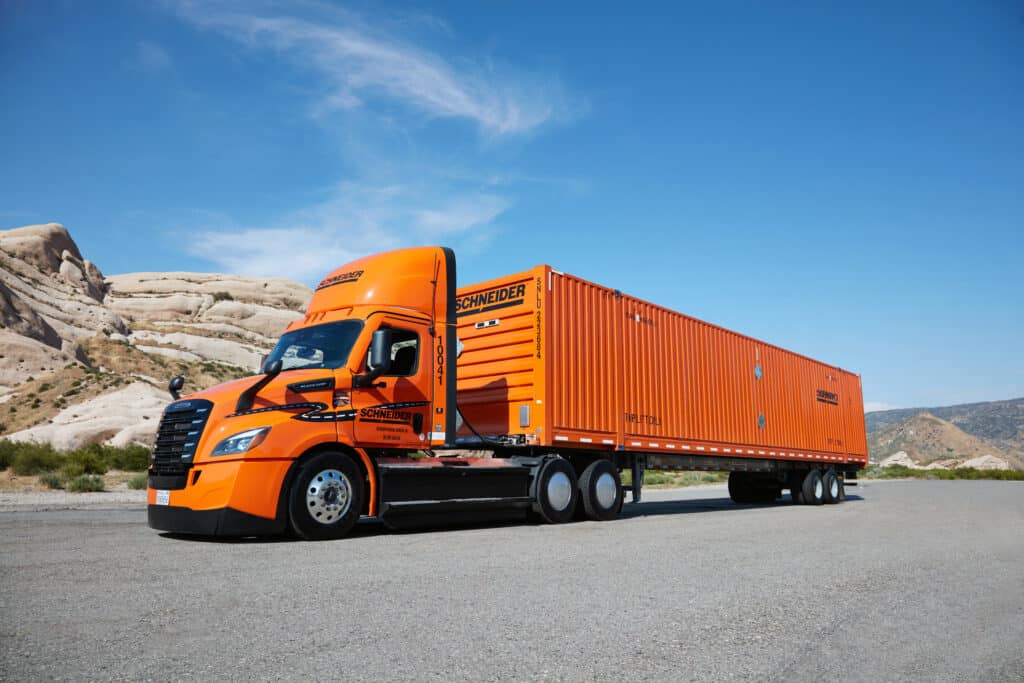General Mills Partners with Schneider to Decarbonize Transportation With Fully Electric Trucks
General Mills is taking bold and commendable steps to address climate change through its innovative G Stands for Good campaign. In a powerful move to reduce the environmental impact of its supply chain, General Mills has partnered with Schneider to integrate fully electric trucks into its transportation network. This collaboration is an important step in advancing the company’s carbon ambition: to reduce emissions by 30% by 2030 and reach net zero by 2050.
Every year, General Mills ships hundreds of thousands of loads of food to customers across the globe. Recognizing that transportation represents about a quarter of the company’s total carbon footprint—and that General Mills doesn’t own its own trucks—the company relies on carrier partnerships to decarbonize its logistics.
“Electrification is just one small solution to decarbonize our network,” General Mills notes. Yet it’s a crucial one. By working with Schneider, a leader in the EV space, General Mills will move 2,000 loads annually using electric vehicles. It’s a move that underscores the importance of collaboration in driving climate action.
This partnership is a key component of General Mills’ updated 2025 Climate Transition Action Plan, released in 2024. Recognizing the profound influence that climate change has on both global food security and the stability of its own raw material supply, General Mills is determined to address these risks head-on while delivering long-term value to consumers and shareholders alike.
The updated action plan reflects the company’s transparent, evolving approach to climate action. It is not a static blueprint, but a commitment to continuous improvement, open dialogue, and industry-wide collaboration. General Mills emphasizes that meaningful climate action requires adaptive strategies, as climate-related challenges intersect with complex issues like farmer livelihoods, biodiversity, and food security.

A Legacy of Science-Based Targets
General Mills was the first company to publish a full value chain climate goal approved by the Science Based Targets initiative (SBTi) in 2015. In 2020, the company adopted a new climate goal aligned with SBTi’s 1.5°C pathway, and in September 2024, it updated its targets to incorporate the Forest, Land and Agriculture (FLAG) guidance.
Through these efforts, General Mills has already made significant progress in reducing scopes 1, 2 and 3 emissions across key areas like energy and manufacturing, packaging, transportation, and agriculture. The company has also worked extensively with external partners to strengthen its climate risk assessments, ensuring its strategies remain data-driven and impactful.

Principles Driving Climate Action
At the heart of General Mills’ climate efforts are four guiding principles:
Rooted in Regenerative Agriculture: General Mills is committed to promoting ecosystems that support soil health, biodiversity, and resilient communities.
Collaborative Impact: Recognizing that the majority of its emissions occur outside its direct operations, the company actively partners across its value chain with public, private, and civil society stakeholders.
Human Rights and Climate Interconnectedness: The company’s climate strategy is fully integrated with its human rights ambitions, reflecting the essential links between climate, people, and community well-being.
Leading with Transparency: General Mills is dedicated to openly sharing progress and challenges, catalyzing broader action across the industry.
G Stands For Good, Episode 5 – Sustainable Transportation
General Mills released a series of videos on Youtube for its G Stands for Good campaign. In Episode 5 – Sustainable Transportation, Erin Richnavsky, an environmental sustainability manager supporting the company’s transportation decarbonization strategies, spoke about the partnership with Schneider to integrate fully electric trucks into its transportation network.
Richnavsky said: We’re really excited to partner with Schneider, a leader in the EV space. And to move 2000 loads on a yearly basis using electric vehicles. Our job, just like General Mills knows their job, is to enhance the lives of people everywhere. Whether it’s in the operational foundations of how we make sure their product is on the shelf or how we’re designing the future around the electrification of their supply chain. It’s a big part of the solution for General Mills. It has been a partnership every step of the way. It’s a really great win from an environmental perspective to switch to electrification.”
By deploying fully electric trucks through Schneider, General Mills is not only reducing emissions in its transportation footprint but also setting a precedent for others in the industry. The partnership showcases how innovative, collaborative approaches can move climate ambitions from plans on paper to real-world impact.
A Comprehensive Climate Roadmap
This transportation initiative aligns with the broader climate roadmap that General Mills has laid out:
Enroll over 600,000 acres in regenerative agriculture programs by 2030
Ensure 100% recyclable or reusable packaging by 2030
Achieve 100% renewable electricity sourcing for its facilities by 2030
Eliminate deforestation in key supply chains
Scale supplier engagement on greenhouse gas reductions
Continuous Progress and Collaboration
General Mills is clear-eyed about the challenges ahead. The company’s 2025 update to its Climate Transition Action Plan, released in 2024, emphasizes that this roadmap is dynamic—an evolving guide, not a static plan. The partnership with Schneider and others is a testament to General Mills’ approach: collaborating across the value chain, learning continuously, and driving collective action.
General Mills is a global food company committed to nourishing lives and advancing sustainability. With iconic brands like Cheerios, Nature Valley, and Pillsbury, the company produces a wide range of products enjoyed by millions of people around the world. General Mills operates with a clear purpose: making food the world loves, while also taking responsibility for the impact of its operations on people and the planet. From sourcing ingredients to manufacturing and distributing its products, General Mills is actively reducing its environmental footprint through ambitious climate action and regenerative agriculture programs. The company’s dedication to innovation, collaboration, and transparency helps ensure that it creates long-term value for its consumers, employees, and communities, while building a more resilient and sustainable food system for future generations.
By centering regenerative agriculture, investing in renewable energy, and supporting supply chain electrification, General Mills is making real progress in reducing its climate impact. The journey to net zero continues, powered by innovation, partnership, and an unwavering commitment to creating a more sustainable future.
General Mills’ climate journey continues to evolve, and the company has pledged to provide annual updates on its progress and strategies. While challenges remain, the company’s bold actions and collaborative spirit exemplify how businesses can lead the way toward a low-carbon future—proving once again that G Stands for Good.

Electric Vehicle Marketing Consultant, Writer and Editor. Publisher EVinfo.net.
Services